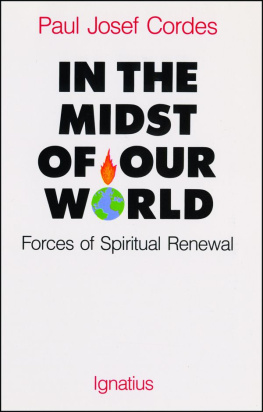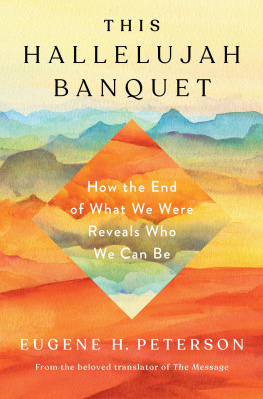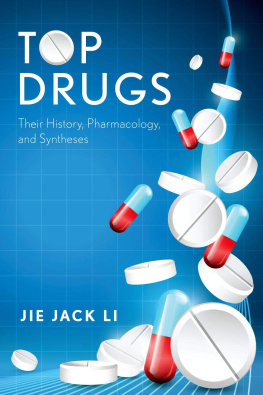HALLELUJAH MOMENTS
Hallelujah Moments
TALES OF DRUG DISCOVERY
Eugene H. Cordes


Oxford University Press is a department of the University of Oxford.
It furthers the Universitys objective of excellence in research, scholarship, and education by publishing worldwide.
Oxford New York
Auckland Cape Town Dar es Salaam Hong Kong Karachi
Kuala Lumpur Madrid Melbourne Mexico City Nairobi
New Delhi Shanghai Taipei Toronto
With offices in
Argentina Austria Brazil Chile Czech Republic France Greece
Guatemala Hungary Italy Japan Poland Portugal Singapore
South Korea Switzerland Thailand Turkey Ukraine Vietnam
Oxford is a registered trade mark of Oxford University Press in the UK and certain other countries.
Published in the United States of America by
Oxford University Press
198 Madison Avenue, New York, NY 10016
Oxford University Press 2014
All rights reserved. No part of this publication may be reproduced, stored in a retrieval system, or transmitted, in any form or by any means, without the prior permission in writing of Oxford University Press, or as expressly permitted by law, by license, or under terms agreed with the appropriate reproduction rights organization. Inquiries concerning reproduction outside the scope of the above should be sent
to the Rights Department, Oxford University Press, at the address above.
You must not circulate this work in any other form and you must impose this same condition on any acquirer.
Library of Congress Cataloging-in-Publication Data
Cordes, Eugene H., author.
Hallelujah moments : tales of drug discovery / Eugene H. Cordes.
p. ; cm.
Includes bibliographical references.
ISBN 978-0-19-933714-9 (alk. paper)
I. Title. [DNLM: 1. Drug Discoveryhistory. 2. Chemistry, Pharmaceuticalmethods.
3. History, 20th Century. 4. History, 21st Century.
5. Pharmaceutical Preparationshistory. QV 711.1]
RM301.25
615.19dc23 2013023203
9 8 7 6 5 4 3 2 1
Printed in the United States of America
on acid-free paper
Dedicated to the memory of Ralph Franz Hirschmann

Contents
TWO THINGS ARE absolutely clear. First, science and its synergistic partner technology are really important in our daily lives, now and going forward. Second, the general population, both in the United States and abroad, suffers from a high degree of scientific illiteracy. As a general rule, we are ignorant of what is really important to all of us.
It is much easier to list things for which science and technology matter critically than to list things for which they do not. Science and technology are at the heart of human and animal health, agricultural productivity, climate change, communications, national defense, economic progress, personal wealth, travel, space exploration, environmental protection, biodiversity, understanding of human history, protection from the elements, and on and on. I will leave it to you to list matters that affect human well-being that are somehow independent of science and technology.
All the matters listed in the previous paragraph are fodder for policymaking. How much of the national treasure should be invested in our science-based federal organizations, including the National Institutes of Health and the National Science Foundation? How do we handle genetically modified foods to ensure both human health and economic growth? What should we be doing to ameliorate global warning and prepare for its consequences? How should we invest to ensure that we have access to clean water and clean air? How do we best protect the abundant biodiversity that our planet offers? What investments in advanced weapons systems will provide maximal national protection at tolerable cost? Should we invest more national treasure in space exploration and, if so, how?
These and related issues are frequently areas of national contention. Given that reasonable and informed people will legitimately disagree on priorities and prospects, it is also true that much of the contention derives from ignorance. Were we, as a people, better informed about science, many of the arguments would fade, better policy decisions would be made, and we would all be better off for it. The people concerned most directly with national policymakingour senators and representativesare no better informed on scientific issues than the general public. And our state senators and representatives are no improvement over those at the federal level.
Scientific illiteracy leads to all sorts of problems. Almost any change will lead some people to perceive themselves as losers as a result of the change. They will fight back with whatever means they have at their disposal, fair or foul. To the extent that we are ignorant of the evidence or cannot judge the validity of the evidence relating to the change accurately, we are victims of those who attack falsely to ensure their personal or corporate benefit.
I can think of no better example than that of the tobacco industry, which effectively resisted evidence of the health threat of tobacco use for years after it was clear to all informed people the threat was real and urgent. Cigarette smoking remains the largest single threat to human health. Through misdirection, misrepresentation, bad science, and creation of a sense of uncertainty where none existed, the tobacco industry protected their profits for years at the expense of a profound negative impact on human health. Our ignorance let the tobacco industry get away with it.
Such stories continue. Specious arguments about global warming, for example, are everywhere, promoted by those global-warming-deniers who see themselves as losers should effective action be taken to combat the real threat. Whether bad policy and bad decisions derive from ignorance or venality, they affect society adversely. We need to do better.
My hope is that this little book has some modest impact on scientific literacy. It seems sensible to me to write about something that I understand. I have spent half of my professional life as a professor of chemistry and biochemistry, and the other half as a scientist doing drug discovery and development in the pharmaceutical industry, so that is what I know most about.
Getting new and useful drugs in medical practice is both important to human health and is understood poorly outside of pharmaceutical houses. It is, I believe, worth knowing about. Beyond that, drug discovery is, in a very real sense, an adventure story. Climbing Mt. Everest is an undertaking in which courage and stamina battle extreme cold, excessive winds, and high altitudes. Gripping adventure stories result. So do failures. Drug discovery is an undertaking in which wit and determination battle uncertainties in human physiology, issues of molecular design, and questions of how to interpret data in the face of regulatory uncertainties. Gripping adventure stories result. So do failures. When you start an ascent of Mt. Everest, your chances of getting to the summit are really pretty good. When you start a drug discovery project, your chances of creating a successful human health product are rather dismal. Ascending Mt. Everest gives you a story to tell. Making a drug has far-reaching consequences, including a positive effect on human health worldwide, which gives you a story to tell.
Next page






